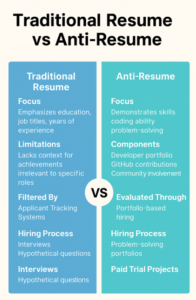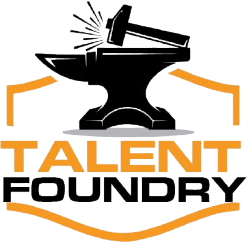
In today’s rapidly evolving tech landscape, a quiet revolution is taking place in hiring practices. Traditional CVs are increasingly being sidelined in favor of tangible demonstrations of skill and problem-solving ability. This “anti-resume” movement is transforming how top engineers showcase their talents and how forward-thinking companies discover them. As we’ll explore, your GitHub contributions, project portfolio, and community engagement may now matter more than that carefully crafted CV you’ve been updating for years.
The Death of the Traditional Resume
The traditional resume is facing extinction in innovative tech sectors, and for good reasons. Let’s examine why the standard CV has become an increasingly ineffective tool for both hiring managers and job seekers:
The Fundamental Flaws
Traditional resumes suffer from several critical limitations in today’s digital-first job market. They lack important context about how candidates achieved their accomplishments and what challenges they overcame along the way(2). Most resumes are designed as one-size-fits-all documents, making it difficult to highlight specific relevant skills for each position(2). Perhaps most importantly, they fail to effectively measure soft skills like communication, leadership, and adaptability, qualities that are increasingly crucial in collaborative tech environments(2).
This is where agencies like Tech Talent Foundry add value. By focusing on problem-solving portfolios and GitHub activity, they identify candidates who thrive in collaborative, agile environments precisely the traits modern tech teams need.
The ATS Obstacle
With more companies using Applicant Tracking Systems (ATS), many resumes are rejected before a human ever sees them, simply due to formatting issues or keyword mismatches(2). This creates a frustrating game of keyword optimization rather than a genuine assessment of talent.
The Talent Gap Reality
The tech talent shortage is real and growing. Globally, there’s a staggering 78% talent shortage in IT and tech sectors(3). With tech jobs expected to grow 15% by 2031, resulting in nearly 700,000 new jobs in the US alone, companies can no longer rely on traditional filtering methods to find talent(3). The old resume-based approach is simply too limiting in this competitive landscape.
What Really Matters: The New Currency of Tech Hiring
If the traditional resume is dying, what’s replacing it? Based on conversations with hiring managers and successful job switchers, several key alternatives have emerged:
Developer Portfolios That Tell a Story
Smart engineers are building “proof of work” portfolios that showcase their actual capabilities rather than just listing their experiences(1). Modern portfolios go beyond simple showcases, they tell stories about problem-solving approaches and demonstrate technical decision making.
For example, developers like Bruno Simon create interactive 3D portfolio experiences that not only showcase their work but also demonstrate their creativity and technical skills in action(4). Others, like Adham Dannaway, use eye-catching graphics on their homepage to display coding and design skills simultaneously(4).
GitHub as Your Professional Identity
Your GitHub profile has become your new resume in many tech circles. Hiring managers are increasingly examining:
- Contribution patterns (consistency matters)
- Code quality and documentation
- Collaboration with other developers
- Types of projects you contribute to
Companies are now more interested in your documented approach to problem-solving than your years of experience. The “problem portfolio”, collections of complex challenges you’ve tackled along with your thinking process, provides a window into how you work that no resume could offer.
Community Contributions as Social Proof
Your participation in professional communities has become a key hiring signal. Whether through GitHub repositories, industry Discord servers, Stack Overflow contributions, or LinkedIn conversations, your public professional presence is increasingly functioning as your new resume(1).
Micro-Credentials Over Traditional Degrees
The rise of specific, targeted certifications is transforming how candidates demonstrate expertise. As one job-switcher shared, “I built a portfolio of small, specific certifications. Each one proved I could solve a particular type of problem. Together, they told a more compelling story than a master’s degree would have(1).
How Hiring Managers Actually Evaluate This New Evidence
So how do companies assess these new forms of professional evidence? The approaches vary, but several patterns have emerged:
The “Show, Don’t Tell” Evaluation
“We get to see real work, and candidates get compensated for their time,” explains Marcus Rodriguez, a hiring manager at a digital product agency discussing how paid trial projects have replaced traditional interviews at his company(1). This approach allows companies to evaluate actual performance rather than interview skills.
The “Try Before You Buy” Revolution
Perhaps the most radical shift: more companies are replacing traditional interviews with paid trial periods. “It’s like dating before marriage,” explains Wei Zhang, who hired his entire product team this way. “Both sides get to experience the real thing before committing”(1).
Looking Beyond Traditional Backgrounds
Forward-thinking companies are considering candidates with nontraditional educational backgrounds, offering apprenticeships and training opportunities, and partnering with local schools and nonprofits to build talent pipelines(3). This reflects a growing understanding that great talent doesn’t always follow conventional paths.
How to Build an Anti-Resume That Works: Practical Steps
Ready to embrace the anti-resume approach? Here’s how to create a powerful professional presence beyond the traditional CV:
Create a Standout Developer Portfolio
Your portfolio website is often your first impression. Consider these approaches:
- Showcase problem-solving: Like Tamal Sen’s portfolio, develop a strong developer aesthetic with a dark theme mimicking an IDE code in the background(4)
- Demonstrate versatility: Show different types of projects solving various problems
- Include case studies: Don’t just show what you built – explain your process, challenges, and solutions
- Make it interactive: Consider interactive elements like Charles Bruyerre’s website with its playful, modern background(4)
- Ensure mobile responsiveness: Like Jesse Zhou’s 3D portfolio that performs well on both desktop and mobile devices(4)
Optimize Your GitHub Profile
Your GitHub profile is increasingly serving as your professional calling card:
- Pin your most impressive repositories to the top
- Write clear READMEs that explain projects’ purpose and functionality
- Demonstrate consistent contribution patterns
- Contribute to open-source projects related to your target roles
- Document your code thoroughly
Build Your Community Presence
Become visible in communities related to your expertise:
- Contribute thoughtfully to technical discussions on platforms like Stack Overflow
- Share knowledge through blog posts or tutorials
- Participate in relevant Discord or Slack communities
- Speak at meetups or virtual events when possible
Document Your Problem-Solving Process
Create a dedicated section in your portfolio that walks through how you approach complex problems:
- Break down a challenging project you completed
- Show your thinking at each stage
- Include dead ends and how you overcame them
- Demonstrate how you measure success
Rethinking Talent in the Anti-Resume Era
The shift away from traditional resumes isn’t just a hiring trend , it’s a fundamental rethinking of how we define and evaluate talent in tech(1). This transition benefits both companies and candidates by focusing on actual capabilities rather than keyword matching.
For job seekers, this means focusing less on crafting the perfect resume and more on building genuine evidence of your abilities. For companies, it means looking beyond traditional credentials to find talented engineers who might otherwise be overlooked.
As you rethink your hiring or job-seeking strategy, remember: the anti-resume isn’t a rejection of tradition-it’s the next logical step in tech’s meritocratic journey. And with allies like Tech Talent Foundry, both engineers and employers can navigate this shift with confidence.
Let Tech Talent Foundry Help You Hire Without the Resume
At Tech Talent Foundry, we help organizations find candidates who are already proving themselves in the wild. By focusing on actual skills, contributions, and practical assessments, we connect companies with engineers who are ready to perform.
If you’re ready to move beyond the traditional resume, we can guide you through the process and introduce you to top-tier talent who are ahead of the curve.
Explore Our Services:
Further Reading:

